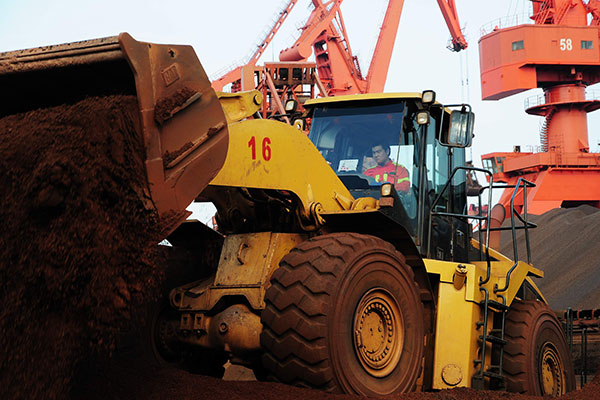Banking and shipping to boost Vale's growth
By DU JUAN (China Daily) Updated: 2015-07-13 07:42
|
 |
|
A worker unloads iron ore from a cargo carrier, owned by Vale SA of Brazil, at a wharf in Qingdao port, Shandong province. [Photo/China Daily] |
Mining giant Vale SA is helping to forge closer links between Brazil and China.
The multinational company has signed cooperation agreements with the Industrial and Commercial Bank of China and the Export-Import Bank of China.
It has also agreed to sell eight large iron-ore carriers to China Ocean Shipping (Group) Company and China Merchants Group.
"I'm confident that strong relations between China and Brazil will bring opportunities for Vale as well as other Brazilian companies," Murilo Ferreira, president and chief executive officer of Vale, said in an interview last month.
Financial support for Vale came after Chinese Premier Li Keqiang's official visit to Brazil back in May.
The mining corporation managed to secure loans worth up to $4 billion from ICBC and up to $2.4 billion from EIBC.
"The agreements signed have demonstrated our long-term commitment to the Chinese market, and we are very confident about future cooperation with Chinese companies," Ferreira said.
Falling commodity prices in iron ore, copper and gold have played havoc with Vale's bottom line.
Along with other mining giants, such as Australian heavyweights Rio Tinto Plc and BHP Billiton Ltd, Vale has had to increase production capacity and cut costs to retain its market share. This has hit smaller mining companies as demand for raw materials stagnate and supply increases.
BHP's iron ore output this year is expected to be 250 million metric tons and aims to raise its capacity to 290 million tons by 2017. Rio Tinto's output will jump from 266 million tons in 2014 to 360 million tons by 2016. Vale plans to follow suit by increasing iron ore production capacity to 450 million metric tons by 2018.
But unlike Rio Tinto and BHP, the company has one other major problem in shipping iron ore to China-logistics.
The distance from Australia to China is less than the voyage from Brazil, so the transportation costs are higher for Vale. Since China is the world's biggest importer of iron ore, this has been a challenge.
"Vale has excellent products like the other two main players, but the shipping distance to China can be a problem when it comes to costs," Wei Zengmin, an industrial analyst at research company Mysteel in Shanghai, said.
- 2015 China International Fair for Investment and Trade kicks off in Xiamen
- China's commodity imports robust in Jan-Aug period
- China stocks rebound 2.92%
- 2015 China box office already past 2014 total
- China foreign trade decline widens in August
- Interview: JP Morgan's senior executive bullish on China
- Innovation, development the focus for NZ mayors
- Lives of freelancers

















